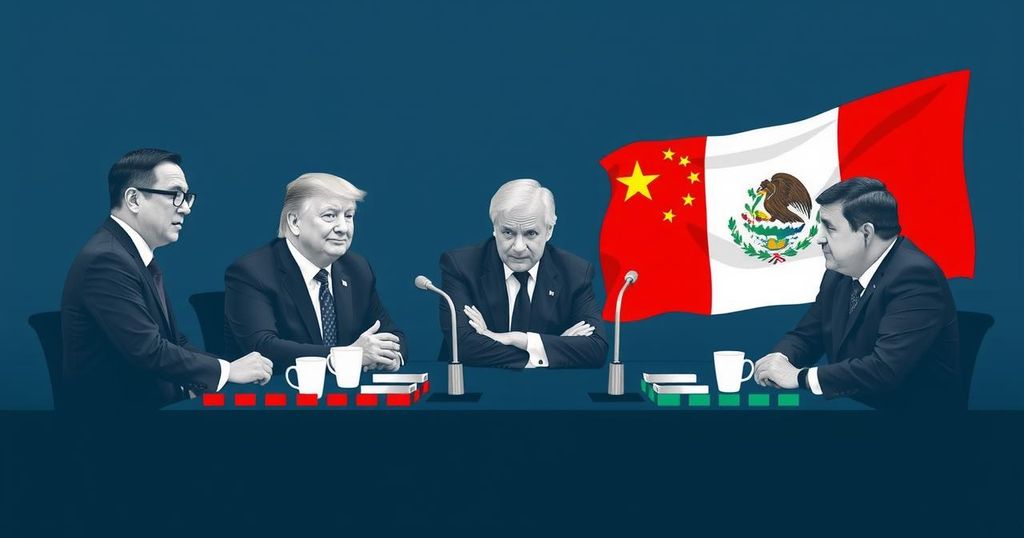Trump’s Proposed Tariffs on Canada, Mexico, and China: Implications and Reactions
President-elect Donald Trump plans significant tariffs on Canada, Mexico, and China, aimed at combating drug trafficking and undocumented immigration. He proposes a 25 percent tariff on imports from Canada and Mexico and an additional 10 percent on Chinese goods, which could impact trade dynamics and lead to increased consumer costs. These measures raise concerns among trading partners and could have broader implications for global economic stability.
In his upcoming administration, President-elect Donald Trump has announced plans to impose significant tariffs on the United States’ primary trading partners including Canada, Mexico, and China. He aims to levy a 25 percent tariff on all imports from Mexico and Canada, alongside a 10 percent tariff on Chinese goods, effective from the first day of his presidency. These tariffs are framed as measures to combat illegal drug trafficking and undocumented immigration, an issue Trump suggests both Canada and Mexico can resolve. The tariffs on Chinese imports would remain until the Chinese government addresses the influx of fentanyl into the U.S. market.
Trump’s threats to impose tariffs have elicited a range of reactions from the involved nations. Canadian officials, emphasizing the significance of their trade relationship with the U.S., expressed concern over the potential economic impact, while the Mexican government indicated it would respond reciprocally to any tariff imposition. China, on the other hand, reiterated that a trade war would not serve the interests of either nation. Following Trump’s announcement, financial markets reacted negatively, contributing to declines in the Canadian dollar and the Mexican peso, as well as a drop in the Chinese yuan.
The imposition of these tariffs could severely affect trade dynamics, particularly within the automobile and technology sectors, which are significantly integrated between the U.S. and its neighboring countries. The tariffs may lead to increased costs for American consumers and could reverse gains made under the United States-Mexico-Canada Agreement (USMCA). Such actions may also provoke broader inflationary pressures within the U.S. economy. Analysts suggest that these tariffs might serve as a bargaining tool for Trump in future trade negotiations, highlighting his transactional approach to international relations.
Ultimately, Trump’s tariff proposals appear to signal a substantial shift in U.S. trade policy, potentially jeopardizing established trade agreements and possibly sparking retaliatory measures from affected nations. The long-term implications of these tariffs resonate not only in trade relationships but could also carry significant repercussions for global economic stability.
Given the interconnected nature of global trade, it remains critical for all parties to navigate these developments with caution. Strong trade ties have historically contributed to economic growth and stability, and any disruption could yield unforeseen consequences on a global scale.
The article discusses President-elect Donald Trump’s plans to impose tariffs on key trading partners, specifically Canada, Mexico, and China. These moves align with Trump’s broader stance during his campaign to address trade deficits and illegal immigration. The proposed tariffs aim to place economic pressure on these nations to take action regarding drug trafficking and migration issues. The context of previous tariff impositions during Trump’s first term adds depth to the current landscape of international trade relations.
In summary, Trump’s proposed tariffs reflect his commitment to tackling illegal drug trade and immigration but also signify a potential overhaul of U.S. trade policy. The reactions from Canada, Mexico, and China reveal apprehension regarding the implications of these tariffs on economic relationships. As financial markets respond to the potential for disrupted trade, the long-term economic consequences may influence both domestic and global markets significantly. Stakeholders must prepare for a future where tariffs could reshape established trade dynamics and bilateral relationships.
Original Source: www.aljazeera.com




Post Comment